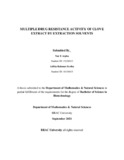Multiple drug resistance activity of Clove extract by extraction solvents
Abstract
Clove extraction is produced from dried clove flower buds, Eugenia caryophyllata L. Merr. & Perry (Myrtaceae), is utilized in the fragrance and flavoring industries, as well as as a topical therapy to reduce pain and promote healing. The extraction's major components are phenylpropanoids such as carvacrol, thymol, eugenol and cinnamaldehyde. The biological activity of Eugenia caryophyllata has been investigated on several microorganisms and parasites, including pathogenic bacteria, Herpes simplex and hepatitis C viruses. In addition to its antimicrobial, antioxidant, antifungal and antiviral activity, clove extractions possesses antiinflammatory, cytotoxic, insect repellent and anaesthetic properties.The antibacterial activity of clove extracts was examined using different extraction solvents in this study. Klebsiella spp., Escherichia coli and Pseudomonas spp. were investigated for antibacterial activity. The antibacterial activity of the methanol extract was higher than that of the water extract. The clove water acetone extract inhibited the development of Escherichia coli, but had no effect on Klebsiella spp., Pseudomonas spp.. In Gram (-) bacteria, the acetone extract of clove extracts demonstrated more sensitive antibacterial action than in Gram (+) bacteria. The antibacterial activity of the clove extract increased as the concentration was raised.

